In defence of counterfactual history
The New Statesman | UK politics and culture
The New Statesman
4.4 • 1.4K Ratings
🗓️ 19 August 2023
⏱️ 25 minutes
🧾️ Download transcript
Summary
What if the rush to war in 1914 had been averted? What if the Berlin Crisis of 1961 had led to nuclear war? What if the liberal revolution of 1848 had been successful? A new exhibition in Berlin considers a series of momentous what-ifs, an intriguing addition to the canon of counterfactual history. In this week’s long read, the New Statesman’s contributing writer Jeremy Cliffe assesses the value of such rival realities, as explored in fiction and, increasingly, on social media platforms and alt-fic online communities. In contemporary British politics, the tumult of the past decade has inspired a new cottage industry of counterfactual histories.
Often derided as pure speculation, Cliffe makes the case for their usefulness and, from his home in Berlin, reflects on the city’s many ghosts. “History is about facts,” he writes. “But those facts include intentions, imagined futures and visions that shape actual events even when – much more often than not – they never come to pass.”
Written by Jeremy Cliffe and read by Chris Stone.
This article originally appeared in the 28 July-17 August summer issue of the New Statesman. You can read the text version here.
If you enjoyed listening to this episode, you might also enjoy Thomas Mann, German identity and the romantic allure of Russia, by Jeremy Cliffe.
Listen to all our Audio Long Reads here
https://podfollow.com/audio-long-reads-new-statesman
Download the New Statesman app:
iOS: https://apps.apple.com/gb/app/new-statesman-magazine/id610498525
Android: https://play.google.com/store/apps/details?id=com.progressivemediagroup.newstatesman&hl=en_GB&gl=US
Subscribe to the New Statesman from £1 per week:
https://newstatesman.com/podcastoffer
Sign up to our weekly Saturday Read email
https://saturdayread.substack.com/
Hosted on Acast. See acast.com/privacy for more information.
Transcript
Click on a timestamp to play from that location
| 0:00.0 | Finance doesn't need to be disrupted. |
| 0:03.0 | It means people who see the potential for progress, |
| 0:06.0 | like faster payments, more transparency, and new ways to meet compliance, |
| 0:11.0 | so that finance can move at the speed of business. |
| 0:15.0 | This is what our blockchain solutions deliver for financial institutions, |
| 0:19.0 | enterprises and central banks around the world. |
| 0:22.0 | Progress is a choice, and it's one you can make right now. |
| 0:26.0 | Ripple, crypto means business. |
| 0:32.0 | This is a paid advert from BetterHelp. |
| 0:35.0 | At the New Statesman, I've been working with the data team |
| 0:37.0 | to look into mental health in the UK. |
| 0:39.0 | We found something really shocking. |
| 0:41.0 | The number of people since before the pandemic, |
| 0:43.0 | who say they suffer from mental health issues because of work, has almost doubled. |
| 0:47.0 | When work or anything else in life gets difficult, |
| 0:50.0 | talking to our problems with a licensed therapist can really help with issues |
| 0:53.0 | such as burnout, stress, depression or anxiety. |
| 0:56.0 | If you're thinking about giving therapy a try, BetterHelp is a great option. |
| 1:01.0 | It's therapy online that has served more than 3 million people around the world, |
| 1:04.0 | and is now available in the UK to make therapy both affordable and accessible. |
| 1:08.0 | It's available via video, phone, or even just message chat, |
| 1:11.0 | so you don't need to see someone on camera if you don't want to. |
... |
Please login to see the full transcript.
Disclaimer: The podcast and artwork embedded on this page are from The New Statesman, and are the property of its owner and not affiliated with or endorsed by Tapesearch.
Generated transcripts are the property of The New Statesman and are distributed freely under the Fair Use doctrine. Transcripts generated by Tapesearch are not guaranteed to be accurate.
Copyright © Tapesearch 2025.

